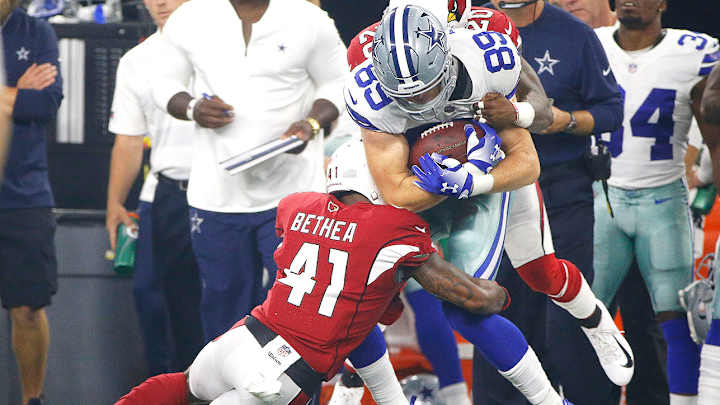Will Officials Relax Enforcement of the New Helmet Rule? Players and Coaches Expect So

Antoine Bethea could guess what I was planning to ask him about. The 13-year safety for the Arizona Cardinals and I had talked about player safety before, years ago, so he was ready.
“I already know,” he said as I approached his locker. “This sh-- sucks.”
The NFL’s new rule forbidding a player from lowering his head and initiating contact with his helmet is the hottest topic among safeties right now. The position group has seen fundamental changes this preseason as the league has clumsily introduced a rule meant to make the game safer for ballcarriers and tacklers alike. The goal for the new rule is to take the helmet out of hitting by penalizing a player 15 yards for an illegal tackle, but coaches and players alike are struggling—players with adjusting their speed and style of play (49ers’ Richard Sherman unleashed his frustration with the rule in a passionate rant on Twitter), and coaches with education. The Cardinals were flagged for three such penalties in one game this preseason.
“The coaches don’t know what to say either,” Bethea said. “They’re looking at some of these plays and thinking the same thing as us: Good form tackle.”
After the first two weeks of preseason games, the league made an effort to provide clarity with additional language clarifying that “inadvertent or incidental contact with the helmet and/or the facemask is not a foul.” That softening on the original rule seems to have already made a difference. There were nine penalties for lowering the head to initiate contact during the Week 3 preseason games, compared to 50 in the first two weeks. It’s a small sample size, but it begins to confirm players’ suspicions that the league wouldn’t let a new rule fundamentally alter the course of games.
Teams are approaching the change differently—in Atlanta, I’ve heard, the coaches have embraced the debate by compiling plays from around the NFL and then soliciting judgments from players based on their interpretation of the rule. But whether teams are sweating the details like the Falcons or leaving players to figure it out for themselves, there’s a consensus among players and coaches I’ve talked to: Almost everyone is holding out hope the officials will scale back enforcement when the regular season arrives.
“I hope they don’t call it like this in the season,” Bethea says. “I think it’s going to be very frustrating for defensive players and fans if they do. You're going to have different refs calling it different ways, because it’s so arbitrary, so no one will ever know what’s acceptable. If a guy catches a ball, how is he defenseless. He has the ball. So I’m supposed to wait until he gathers himself and makes a football move and then I can tackle him? There’s no clarity with this rule.”
NFL Standing Behind New Helmet-Lowering Rule Despite Messy Acclimation Period
Los Angeles Chargers safety Jahleel Addae never believed the NFL would let outcomes of games be altered by a new rule few agree on.
“I think because it’s the preseason they’re trying to make us aware that its going to be called more,” Addae says. “I don’t think they’ll call it as often [in the regular season] as they are right now. The best thing we can do is keep our head out of it and try to wrap up tackle.”
Addae, who says he suffered two concussions in 2015 and has been fined four times for helmet-to-helmet strikes during his career, laments the ever-shrinking target for defensive players. He’s not convinced officials can adequately judge when a ballcarrier lowers his head and creates helmet contact with a tackler who was aiming for the ballcarrier’s chest, so now he zeroes in just below the hips. The expectation that a defensive player can do that, while keeping his chest out and head up, is what worries defensive coaches.
With several teams, particularly those with coaches connected to the Pete Carroll coaching tree, the rugby tackling method is taught as a means of avoiding injury and penalty. In rugby, a quality form tackle is not necessarily one that halts a ballcarrier’s momentum—instead it’s acceptable and even advantageous for the offensive player to fall forward, so the ball can be stripped from his possession as play continues. Rugby players often tackle with the outside shoulder, leaving the head behind the offensive player, as opposed to crossing the face in an effort to reverse momentum.
49ers defensive coordinator Robert Saleh has been teaching rugby tackling ever since his days as an assistant in Seattle from 2011-13, when Carroll introduced the amendment to traditional football teaching to a defense that would soon be considered the class of the NFL. The biggest safety improvement of the rugby tackling method is arguably the reversal of teaching that stressed putting the head across the body.
“No more head across the bow,” Saleh says. “We’ve been doing it almost seven years now, and we’ve been teaching it head for more than a year now. But your head is always going to follow your body. It’s a natural process. [The NFL is] asking guys to tackle with their chest, with their faces up. You’re going to cause more injury, putting guys in that vulnerable position that will make the problems worse.
“We’re confident in the way we’re teaching it. Sometimes the helmet slips, so as long as the rule understands that the head follows the body, and differentiates between attempting to use the head and, oh god, it slipped in there. There’s so much grey area. Some of the calls you think, eh, I hope they don’t really want to call this stuff.”
NFL’s New Helmet Rule Is Unpopular Among Players... So What Happens Next?
Los Angeles Rams second-year safety John Johnson says he’s never been one to throw his head into contact, but he’s seen plays this preseason where defenders were flagged in scenarios where few other options existed, or the play developed to suddenly to make an adjustment.
“We don’t want to slow ourselves down,” Johnson says. “It’s difficult to change because we’ve been doing this our whole lives. The shoulder is connected to your head, so trying to get your head completely out of it is a difficult thing to do. Officials came in and gave us the whole spiel, but the vets are saying it won’t be like this in the season. They say that's usually how it works.”
For Bethea and others, a more clearly defined rule would be helpful. Even better? Input. “At the end of the day, it’s not the players’ league,” Bethea says. “Because if it was, they would call us in and ask us how we see it before they make changes.”
